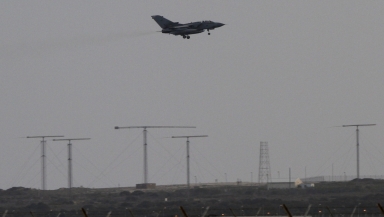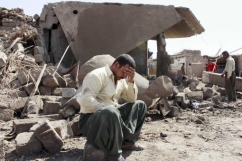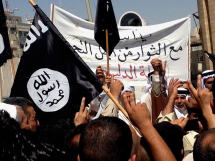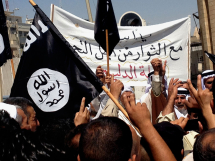
We're bombing Iraq again. Isn't it nostalgic? Saturday saw the first UK bombing raids against ISIS targets and public support in the UK is overwhelmingly in favour of it. We Christians have been pretty supportive too, it seems. Not that our support was hard to gain. After all, ISIS is almost cartoonishly evil and brutal, the magic ingredient of Christians suffering is there to make us care, and there's a charismatic lone-Christian-hero figure calling for action from his church in Baghdad. What's not to support? But now that our righteous wish for war (or 'tactical airstrikes', though the civilians who will inevitably be caught up in them will probably have a hard time making that distinction) has been granted, perhaps it's time to ask some tough questions of ourselves about our support.
Will it work?
Almost certainly not. From military experts free to speak their minds to politicians with experience of failed interventions, critics this week lined up to attack the bombings. They point to the lack of a political (or military) plan for what happens after the bombings. They raise the point that aerial bombardment alone will force ISIS to blend in with civilian populations, meaning either a halt to air strikes or civilian casualties. Many argue that the remit is simply too narrow: airstrikes alone, and only in Iraq. In many ways, this is the worst of all possible strategies for achieving strategic goals in Iraq. Unless your goal has been to be seen to be doing something. Which is, of course, both Obama and Cameron's goal here. So it's probably not too soon to quote a famous banner and say: "mission accomplished!"
Is this what the terrorists want?
Yes, according to some analysts, and they may be right. Social media videos of beheadings and the deliberate targeting of westerners and use of British 'spokespeople' point to a goading, provoking of the UK. Just classic jihadi bluster? Maybe. But look at the gains to be had by ISIS if the UK and US blunder in. ISIS is almost universally hated by the Muslim world, barring those who already hold their ideology. How better to get more people on your side than to portray yourselves not as bloodthirsty thugs who are killing fellow Muslims but as heroic freedom fighters repelling a western invasion? Even people who dislike you will find it hard to forget the US-led coalition left in Iraq and the brutality and unaccountability of its private security forces. Many of them will begrudgingly support your resistance. Let the West kill a few civilians (as they routinely do with their drones in Pakistan) and watch the landscape of opinion shift.
Will it keep us safe?
Almost certainly not. Quite the opposite, in fact. We've just directly attacked an organisation that has sworn to use terror against its enemies. And while we cannot let terrorists dictate our policy or send us running scared, to pretend that attacking ISIS makes us more, rather than less safe is insane. But leaving aside the hornet-nest-poking aspect of our airstrikes, the danger of civilian casualties (which the West finds it so difficult to avoid even in 'precision' drone strikes) or worse, a perceived invasion (the 'boots on the ground' that both Obama and Cameron promise will never happen) will make us seem legitimate targets again for a broader base of enemies. Remember: the last Iraq war was the best recruitment tool Al Qaeda ever had.
Why there and why us?
Why, for instance, did we never send troops in when central Africa was being torn apart by various countries and militias? Were it happening now, would we, the UK, be calling in airstrikes? Millions died, and yet I think not. If barbarity and a disregard for human rights is the key criterion (or, indeed, a propensity to start wars), we could all think of a number of countries just crying out for a bombing. But, awkwardly, some of them are our coalition allies against ISIS. A more selfish question is why it should be us? The answer is, partly, that this is our mess and we should clean it up and that is compelling. The US and UK left Iraq broken and easy pickings for the likes of ISIS. Our lack of commitment to anything other than defeating an enemy and securing contracts for our oil and infrastructure companies left a government in Iraq that brought ISIS on itself, but let's not forget that we put that government there. Part of the answer to the question of why Iraq and why Britain was answered in the run-up to airstrikes, of course. Not doing anything would make us look bad. Getting involved on a moral pretext (but only in strategic areas) makes us look important. The fact that Christians seem mostly to get upset about human suffering when Christians are the target (and when the enemy holds another religion) has no doubt added fuel, too.
Why is Jesus not more supportive?
We are rightly concerned for our Christian brothers and sisters in Iraq (though our apparent lack of concern seeking his counsel today is important, but I also believe in Scripture. 'Brutal, oppressive, violent' – these epithets are all regularly applied to ISIS as a reason why it is right to attack them. And certainly, if any force in recent times was deserving of our enmity and ire, it is ISIS. But the Romans crucified thousands. They tortured their way across the known world, imposing their own rule by force on local populations, forcing their religion on them too. And yet Jesus says nothing about rising up against them. He never once encourages a disciple or a member of the crowd to take up arms and kill. On the contrary, he uses Romans as examples not only of goodness among the godless but as opportunities to show grace.
I'm not actually a pacifist, and I am not saying that war is always the wrong choice. But, as followers of Jesus, who allowed himself to be tortured to death by oppressors, we need to be the hardest people to convince that violence is the answer. Asking ourselves hard questions is part of that.
Jonathan Langley is a freelance writer and works for a Christian mission and development agency.












![President Obama ISIS speech video; Transcript [Full Text]](https://www.christiantoday.com/media/cache/thumbnail/4/05/40504sh_287w_162h_1x_1y.png)





